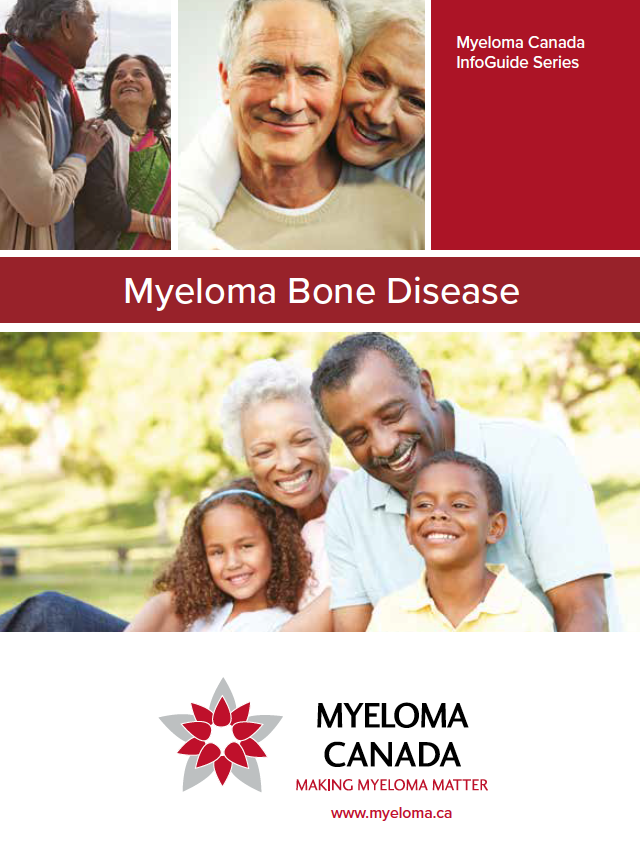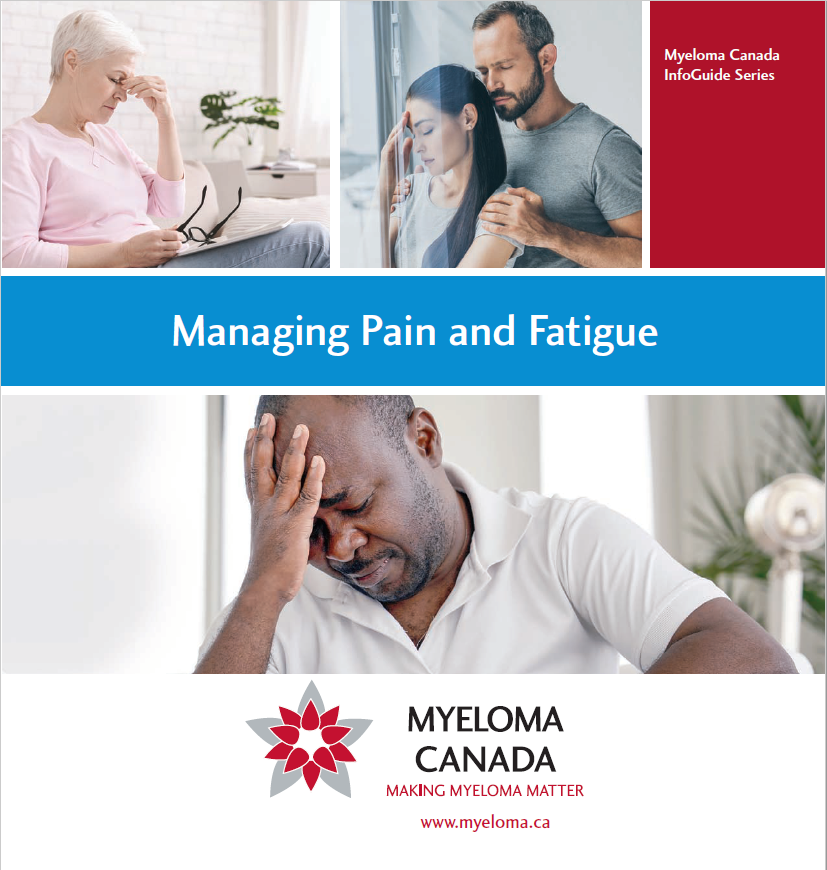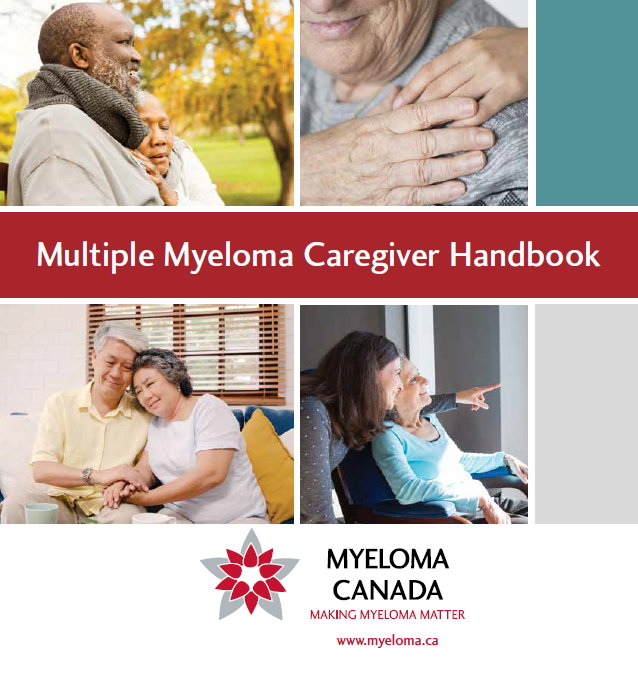
How myeloma and treatment for myeloma may affect you
The build-up of myeloma cells in the bone marrowSpongy tissue that is found inside your bones. It is soft, fatty and full of blood vessels. Your bone marrow is where most of the blood cells in your body are made. can lead to a number of medical problems, or complications, that need to be identified, monitored, and treated. Similarly, treatment for myeloma can cause side effects that require monitoring and/or management themselves.
Under normal conditions, both types of cells keep the rate of bone formation and bone breakdown equal, so that bone mass remains the same.
Myeloma cells stimulate the osteoclasts (the cells that break down bone) while at the same time interfering with the production of osteoblasts (the bone-forming cells). As a result, bone is broken down faster than it can be replaced, leading to:
Increased risk of fractures
- Even everyday activities can cause bones to break.
Bone pain
- Experienced by the majority of myeloma patients.
- X-rays and bone density scans are used to monitor bone loss and check for damage.
- BisphosphonateDrugs used to prevent the loss of bone mass and used to treat myeloma bone disease, as well as bone-weakening conditions like osteoporosis. drugs are routinely prescribed to strengthen the bones.
- Radiation therapyTreatment with x-rays, gamma rays, or electrons to damage or kill malignant cells. The radiation may come from outside the body (external radiation) or from radioactive materials placed directly in the tumor (implant radiation). can be used to treat bone lesions and relieve pain.
- Procedures can be performed to stabilize fractures of the spine (ie, vertebropasty, kyphoplasty).

Learn more about how myeloma can affect your bones in Myeloma Canada’s Bone InfoGuide.

Is exercise safe?
Unless there are reasons not to exercise, mild or moderate activity, such as walking or swimming, may be physically and emotionally beneficial. Avoid contact sports or activities that could result in falls. A physiotherapist or your healthcare team may be able to suggest activities that are appropriate for you.
It’s always important to check with your healthcare team before starting any new physical exercise or activity.
Bone pain, nerve pain, and neuropathy
There are 3 main causes of pain for myeloma patients.
The type(s) of treatment required will depend on the cause of the pain, the severity of symptoms, and response to different therapies.
Bone pain
- Associated with bone damage and fractures.
Nerve damage
- Often due to compression fracturesBreaks in the bones of the spine that cause it to collapse and compress..
Peripheral neuropathy
- Usually this occurs in the feet, legs, hands, or arms and can be experienced as:
- a painful sensitivity to touch
- the sensation of “electric jolts”
- a burning, tight, or pulling sensation
- numbness or a “pins-and-needles” feeling
Treatment options include:
- pain medication and anti-inflammatories
- radiation (for bone pain)
- vertebroplasty or kyphoplasty (for nerve damage due to compression fractures)
- other types of medication, such as tricyclic antidepressants and anticonvulsant medications (for neuropathic pain)
Anemia
When high numbers of myeloma cells crowd out red blood cellsMinute structures produced in the bone marrow; they include red blood cells, white blood cells, and platelets. and decrease their production in the bone marrow, this leads to a reduced red blood cellThe basic unit of any living organism. count. Red blood cells contain hemoglobin which carries oxygen from the lungs to cells throughout the body, providing stamina and energy. A low hemoglobin count can lead to anemiaDecreased blood hemoglobin level. Hemoglobin is found in red blood cells and carries oxygen around the body..
Extreme fatigue
- You feel tired even though you’re getting enough rest.
Shortness of breath
- You’re out of breath after even mild exertion.
Difficulty concentrating
- You may find it hard to focus, do daily chores, or remember things.
Other symptoms
- You may look pale, feel lightheaded or dizzy, experience headaches, have leg pains, or feel cold.
- If your anemia is related to a change in your diet, eating healthier or taking iron, vitamin B12, or folic acid (folate) supplements may help.
- In severe cases, blood transfusions can be used to quickly increase hemoglobin in the short term.
- Your doctor may prescribe medication to stimulate the production of red blood cells.

Why treat anemia?
Studies have shown that treating anemia in people with cancerA term for diseases in which malignant cells divide without control. Cancer cells can invade nearby tissues and spread through the bloodstream and lymphatic system to other parts of the body. can help:
- relieve fatigue
- make everyday activities easier
- reduce the need for blood transfusions
- improve quality of life
- make it more likely they’ll be able to complete their cancer therapy

Learn more in the Managing Pain and Fatigue InfoGuide.
Kidney damage
In myeloma, instead of producing antibodies that fight infection and disease, abnormal plasma cellsSpecial white blood cells that produce antibodies. The malignant cell in myeloma. Normal plasma cells produce antibodies to fight infection. In myeloma, malignant plasma cells produce large amounts of abnormal antibodies that lack the capability to fight infection. The abnormal antibodies are the monoclonal protein, or M protein. Plasma cells also produce other chemicals that can cause organ and tissue damage (i.e. anemia, kidney damage and nerve damage). (myeloma cells) overproduce proteins (called monoclonalA clone or duplicate of a single cell. Myeloma develops from a single malignant plasma cell (monoclone). The type of myeloma protein produced is also monoclonal; a single form rather than many forms (polyclonal). The important practical aspect of a monoclonal protein is that it shows up as a sharp spike (M spike) in the serum electrophoresis test. protein, monoclonal immunoglobulin, or “M” protein). These can cause serious complications and affect different parts of the body including the kidneys.
M-proteins produced by myeloma are cleared from the body by the kidneys, so with time, elevated levels of abnormal M-proteins in the blood and urine can cause damage to the kidneys.
Severe kidney disease may require dialysisWhen a patient's kidneys are unable to filter blood, the blood is cleaned by passing it through a dialysis machine. (infrequently)
- The best way to prevent kidney damage is to treat the myeloma and keep the M-proteins as low as possible.
- Kidney function should be assessed regularly by measuring levels of creatinineWaste product produced by the body that is broken down in the kidneys. in the blood.
- Drinking lots of fluids, ideally 6–8 glasses of water per day, can help:
- flush medication and toxinsPoisons produced by certain animals, plants, or bacteria. from your body
- maintain normal blood volume and pressure
- lubricate your joints
- reduce fatigue
- prevent kidney damage
- Limit your consumption of drinks that contain caffeine (ie, coffee, tea, soft drinks, etc.) and alcohol.

Learn more about how myeloma can affect your kidneys.
Infections
Myeloma and some of its treatments can affect the normal production of antibodies and reduce the white blood cell count, making it harder for the body to fight off infections.
Increased susceptibility to infections
- Repeated infections, especially respiratory infections, or illnesses.
Longer time required to recover from infections or illnesses
- Fever or signs of infection should be reported promptly to your healthcare team.
- You can help reduce the risk of infections and illnesses by:
- practicing good hand-washing techniques
- washing your hands frequently or using a hand sanitizer
- avoiding situations that place you in contact with people who are ill
- wearing a surgical-grade mask when you have to be in a densely crowded environment.
- AntibioticsDrugs used to treat infection. may be required before dental work to reduce the risk of infection.
Constipation
More frequent urination
Weakness
Confusion (in extreme cases)
If you have myeloma, NEVER take a calcium supplement without checking with your doctor. Too much calcium in the blood can be unhealthy.
Pain medication dependency and addiction
It’s important to work closely with your doctor and healthcare team to find the right pain management strategies for you.
Don’t hesitate to discuss any concerns you may have with your medical team; they can answer your questions and recommend pain relief options that are right for you.
Dental health
Dental health is very important for myeloma patients.
Encourage your dentist to talk to your oncologistA doctor who specializes in treating cancer. Some oncologists specialize in a particular type of cancer treatment., to discuss any special precautions you may require, especially while you are receiving treatment.
Increased risk of infection
Osteonecrosis of the jaw (ONJ)
- Rare side effect of long-term use of bisphosphonates.
- Practice good oral hygiene to reduce the odds of needing dental care.
- See your dentist regularly to catch potential problems when they are small.
- Get a complete dental examination before starting any therapy.
- Because myeloma increases the risk of infection, antibiotics may be required before undergoing dental work.
- Avoid extractions and periodontal surgery, if possible, as well as dental implants.

Fatigue and pain are common side effects of treatment. Learn more about how to cope with them in the Managing Pain and Fatigue InfoGuide.

Keep track of any side effects
you may be experiencing in Myeloma Canada’s Myeloma Monitor application
Common side effects of chemotherapyThe treatment of cancer with drugs that kill all rapidly-dividing cells. Treatment with one or more drugs that kill all rapidly-dividing (cancer) cells. Chemotherapy can reduce the number of myeloma cells in the bone marrow and the M-protein they produce. Chemotherapy cannot “cure” myeloma but it may stop it from progressing or getting worse for a period of time.
- Anti-sickness (anti-emetic) drugs can help prevent nausea and vomiting.
- Avoid strong smells.
- Try and get a lot of fresh air.
- Try to stay hydrated by taking frequent sips of cool drinks.
- Common with some, but not all, types of chemotherapy.
- If it happens, remember that your hair will grow back when your treatment is finished.
- Medicines or special mouthwashes (without alcohol) can help.
- During high-dose intravenous therapy, sucking on ice chips can help prevent mouth sores.
- Keep your teeth clean by using a soft toothbrush.
- Avoid spicy, salty, or tangy foods that can irritate your mouth, as well as foods that stick to the roof of your mouth (ie, peanut butter, chocolate, etc.).
- Moisten your food with gravy or sauces.
- To avoid losing weight, try to eat small amounts of food, particularly fresh fruits and vegetables, frequently throughout the day.
- If you feel hungry at some parts of the day and not at others, eat your larger meal when you’re hungry.
- No matter what you eat, be sure to always drink plenty of fluids.
More tips on how to maintain a healthy diet during chemotherapy and browse recipes developed specifically for people living with myeloma.

It’s important to explore ways to improve your psychological and emotional well-being. Some people find that complementary therapies may help to alleviate or reduce symptoms and side effects.
Always check with your healthcare team before starting or adding any new complementary therapy to your regime.
Coping with “roid rage”
Dealing with a diagnosisThe process of identifying a disease by its signs and symptoms. of cancer is hard on you and your loved ones. Mood changes that can be brought on by steroids can make things even more challenging.
Be sure to explain to your loved ones how steroids can affect your mood and activity levels. Give them a “heads up” when you go on or off your medication. Chances are they’ll be more supportive and understanding (and won’t take things too personally) if they know that sometimes “it’s the ‘roids talking”… not you!

Myeloma Canada’s Multiple Myeloma Caregiver Handbook helps caregivers understand and accept their and their loved one’s feelings and needs. It also offers practical advice and strategies on supporting themselves throughout this experience.
Depression is real and should not be taken lightly.
Don’t ignore it or try to deal with by yourself. Talk to your healthcare professional, whether it’s your doctor, nurse, or counsellor. Sometimes, just sharing your thoughts and feelings is enough. In other cases, therapy or medication may help.
No matter what, always remember that you’re not alone.
Before considering alternative therapies…
…there’s something you should know.
Many vitamins, supplements, and herbal products can interact with your cancer medications.
NEVER take any vitamins, supplement, or herbal therapy without first consulting your physician
and/or your pharmacist.





